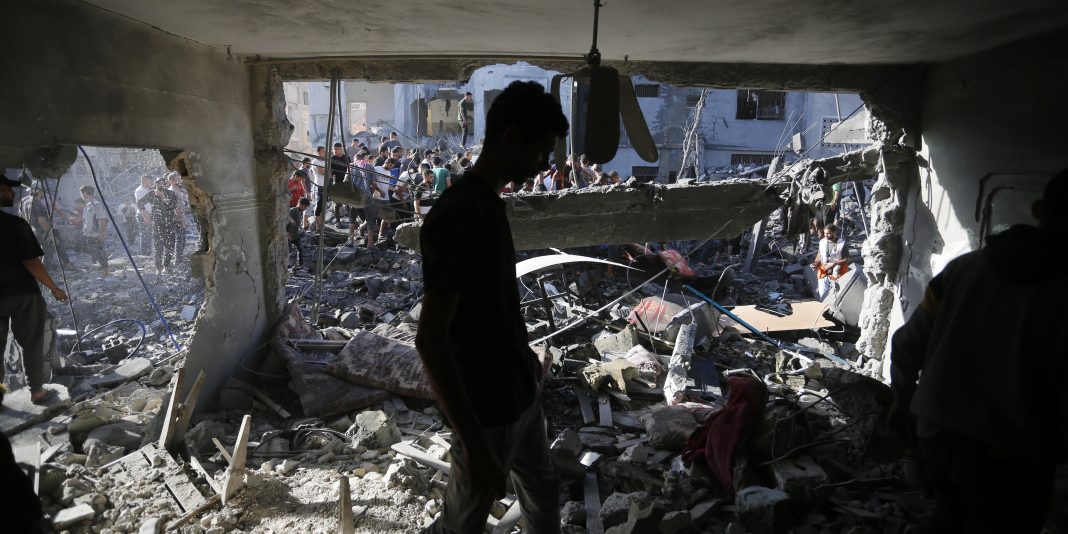As the conflict in the Middle East intensifies, the humanitarian crisis in Lebanon and Gaza deepens, with more than 1 million people displaced from their homes in Lebanon alone. This staggering number comes in the wake of Israel’s relentless bombing campaign, which has escalated dramatically following the assassination of Hezbollah leader Hassan Nasrallah. Reports indicate that Israeli airstrikes have obliterated entire residential blocks in and around Beirut, resulting in at least 136 fatalities in just the past 24 hours, according to Lebanese officials.
Simultaneously, the situation in Gaza remains dire. Over the past year, Israel’s military operations have led to the deaths of at least 41,500 individuals and displaced approximately 1.9 million people from the besieged enclave. In the last day alone, airstrikes in Gaza claimed the lives of at least 28 people, underscoring the ongoing violence that has characterized this conflict.
In response to these developments, President Joe Biden has publicly advised against an Israeli incursion into Lebanon. However, the U.S. administration continues to provide substantial military support to Israel, with reports indicating that Israel has secured $8.7 billion in military aid from the United States, of which $3.5 billion has already been dispatched. Notably, the bomb that killed Nasrallah was reportedly a U.S.-made weapon, raising questions about the implications of American arms sales in the region.
Amidst this backdrop, progressive lawmakers in the United States are amplifying their calls for a reassessment of U.S. military support for Israel. Senator Bernie Sanders has introduced legislation aimed at blocking the sale of $20 billion in offensive weapons to Israel, echoing sentiments expressed by other members of Congress, including Representatives Cori Bush and Rashida Tlaib, who have advocated for an arms embargo. This push for legislative action reflects a growing concern among progressives that U.S. complicity in the violence must be addressed.
Political analysts suggest that these legislative efforts are not merely symbolic but serve as a critical signal to the Biden administration regarding the urgency of addressing the humanitarian crisis. Siniša Vuković, director of the Global Policy program at Johns Hopkins University, notes that the timing of these resolutions is strategic, aimed at influencing the political discourse as the November elections approach. He emphasizes that the Democratic Party is increasingly aware of the potential electoral fallout from its support of Israel’s military actions, particularly among uncommitted voters.
While the proposed resolutions may not have an immediate impact on the ground—given that Israel is not currently facing a shortage of military supplies—they carry significant moral and political weight. Humanitarian experts argue that an arms embargo would send a powerful message to Israel regarding its adherence to international law. Amanda Klasing, national director of government relations and advocacy at Amnesty International USA, asserts that the U.S. must take concrete actions to hold Israel accountable for its military conduct, which has reportedly involved the use of U.S.-made munitions in unlawful attacks that have resulted in civilian casualties.
Moreover, Sarah Yager, Washington director at Human Rights Watch, emphasizes the strategic implications of U.S. arms sales to Israel. She argues that the U.S. is undermining its own principles by continuing to support a military that operates outside the bounds of international law. This contradiction not only affects the U.S.’s moral standing but also has long-term repercussions for its foreign policy and relationships in the region.
As the conflict unfolds, the call for a reassessment of U.S. military support for Israel is becoming increasingly urgent. The humanitarian crisis in Lebanon and Gaza demands a response that prioritizes the protection of civilians and adherence to international law. The actions taken—or not taken—by the U.S. in the coming months will likely shape the future of U.S.-Middle East relations and the broader geopolitical landscape.


